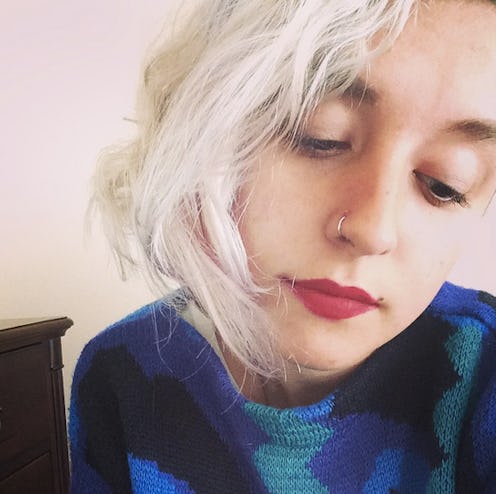Fashion
A Journey To Loving My "Flawed" Skin

For as long as I can remember, I've been struggling to find effective treatments for my sensitive skin. Since birth, my skin has always been highly susceptible to redness and irritation. And like my physical skin, my "emotional skin" (the shell that's meant to insulate me from the world to some degree) is not much to brag about. Always embarrassed of my skin and worried about the opinion of others, I often hid and took huge offense to any criticism I'd receive. "You need to grow a thicker skin," I was told.
As a baby, I had a very itchy scalp that was covered in a rash most of the time. My parents told me I'd rub my head against the pillow, hoping for some relief, but instead caused much of my new hair to continuously fall out.
In early childhood, I was covered with eczema, a skin condition that often leaves the skin dry and prone to breaking out in rashes. My face, arms, and thighs had active rashes all over them based on the season: My arms during the dry winter months, my thighs during the sweaty summer season, and my face broke out whenever I was stressed all year round.
Scratching them only made the rashes spread more, but I was too itchy to leave them alone. I'd get relief every now and then, with a new ointment or cream my dermatologist would give me. Even as the creams became progressively stronger, containing more and more concentrated amounts of cortisone, they would stop working in a few months time. I spent each day using every ounce of willpower to stop myself from scratching.
Things got worse when I started puberty. Like most teens, I had extremely acne-prone skin. Breakouts became more and more common, and criticism from peers led me to desperately seek ways to cover it up. However, much of the acne solutions I was using at the time, which focused on drying up oily skin, were not making my dry eczema patches happy.
As a teen, I did not like makeup at all. Despite that, I tried many foundations and powders out in an effort to cover up my rashes and conceal my blemishes. Unfortunately, they only clogged my pores further and made me break out more. Popping pimples irritated my skin, and began to cause scarring on my face. Any application of product or slight change in routine would result in red and noticeable flareups. So I gave up.
Ashamed of my skin and my failed attempts to change it, I stopped using all products and makeup and tried to come to terms with what it was. But really, I just hated what I saw in the mirror for years, and felt powerless to change it.
Once I started leaving it alone, my skin began to clear up a bit. The eczema slowly became less severe as I worried less about it. But for the most part, my acne persisted.
When I started college, I began learning about the importance of body positivity, and it began making less and less sense to look at myself so critically and hatefully. Why change anything about my body? Why not love it instead? And slowly but surely, I began to do just that.
Self love has played a major role in helping me better deal with my anxiety disorder, and a calm Meg became a happy and body-loving Meg. I began taking photos of myself constantly without any makeup on, sometimes using filters to accentuate the dark or irritated parts of my face. I began to love my flawed skin as much as I love my eyes or my breasts or any other part of my body I find particularly beautiful.
I learned to accept the prickly rash on my arms, the acne on my back, the irritated skin around my newest piercing, the occasional eczema by my mouth. I tend to every "problem" area with love, and leave the areas that are too sensitive alone. I care for my ever-present keloid, which returns whenever I'm particularly anxious, with the patience of a saint. I gifted the prickly and acne-prone parts of my body with beautiful tattoos. The more love I showed myself, the less anxious I became, and the more my skin cleared up.
These days, I try to document my flareups with numerous selfies and Instagram photos. I do this so I never stop loving the person in the mirror, even if her face and skin are highly sensitive. Taking these photos is an important practice of self-love, and it shows me the commitment and effort I'm putting into loving myself.
I refuse to shy away from my sensitive skin, and rather force it to the forefront — as I tend to do with my queerness. By forcing people to look at it, I start a conversation about beauty norms. I want to show that there is space in beauty for people who look like me, and that I can have flawed skin and still be beautiful and fashionable.
Some of my peers and the trolls of Facebook may take some measure of joy to call me out on my skin, but I will never stop being who I am and loving my skin for exactly what it is. I will never stop taking photos of myself during an acne breakout or an eczema flareup. You may see a girl with "poor hygiene" or "an uneven skin tone," but I see a person who has spent years cultivating self-love to fight the shame and pain associated with skin problems.
And who is now letting the light shine on her and her skin without shame. With or without sensitive skin, I am beautiful and worthy of love.
Images: Meg Zulch; the_ladyjane/Instagram